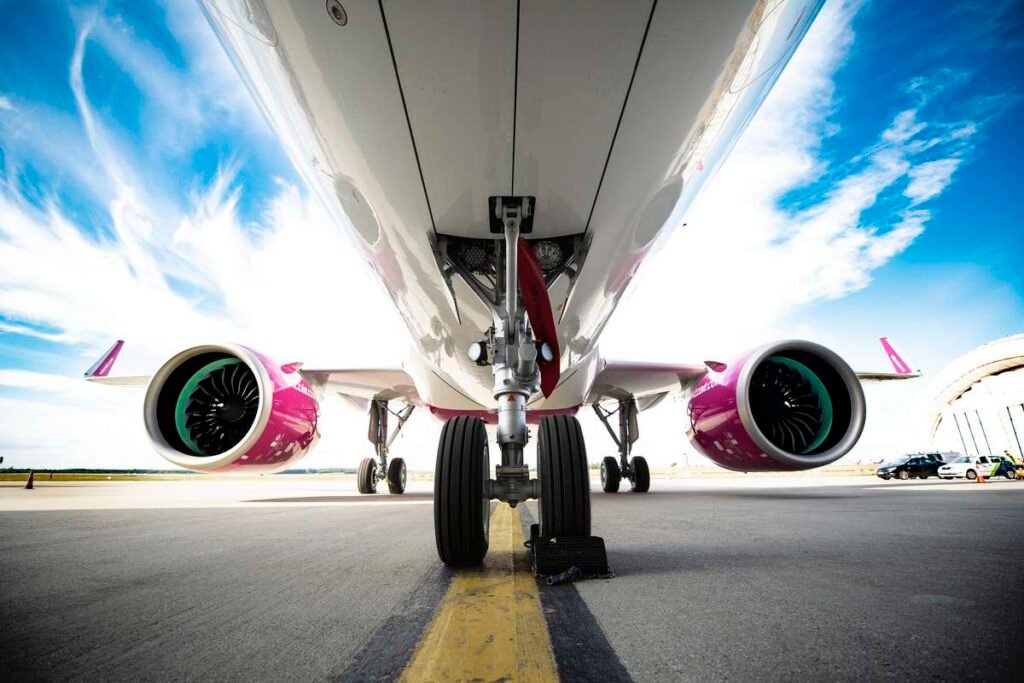[aviation news]
Wizz Air’s 2025 Sustainability Report, covering the financial year ending March 31, 2025, showing the airline’s measurable progress in environmental, social, and governance (ESG) areas.
Independently verified, the report highlights Wizz Air’s commitment to sustainability, earning it the title of the world’s most emissions efficient airline from Ciriuman independent analytics firm.
This achievement reflects the carrier’s focus on innovation, efficiency, and long-term responsibility. This article reviews the airline’s key sustainability initiatives and focuses.
Wizz Air Sustainability Initiatives
Driving Environmental Efficiency with Modern Fleet
Wizz Air continues to lead the industry with an emission intensity of just 52.2 grams of CO₂ per passenger kilometre, among the lowest globally.
The airline’s ultra-modern fleet, averaging 4.7 years old, is the youngest in its class, boosting fuel efficiency and minimising environmental impact.
Over 66% of its 231 aircraft—147 Airbus A321neos and 6 A320neos—are powered by Pratt & Whitney GTF engines. These engines cut fuel use and CO₂ emissions by 20% compared to older models and reduce noise pollution by 50%.
Wizz Air’s Customer First Compass commitment drives its push for sustainability through advanced technology. The airline aims to transition to an all-neo fleet by 2028, positioning it as Europe’s leader in eco-friendly aviation.
To mark 20 years of partnership with Airbus, Wizz Air introduced a special livery aircraft, celebrating past milestones and future innovations in aviation technology.

Advancing Sustainable Aviation Fuel (SAF)
Wizz Air is taking bold steps toward reducing emissions through Sustainable Aviation Fuel (SAF). Between October and December 2024, the airline conducted SAF trial flights on routes from Barcelona to Budapest and Brussels Charleroi to Budapest.
The carrier partnered with Moeve and World Fuel Services to carry these flights out. These trials are part of the overall goal to achieve 10% SAF usage across its flights by 2030. This data-driven approach ensures steady progress toward greener operations.

A Clear Path to Net-Zero Emissions
Wizz Air’s decarbonization roadmap, unveiled on Earth Day, aligns with the International Civil Aviation Organization’s (ICAO) goal of net-zero emissions in international aviation by 2050.
The roadmap calls for collaboration between governments and industry bodies to achieve meaningful sustainability advances.
By focusing on innovation and practical solutions, Wizz Air is setting a new standard for responsible aviation.
Dorottya Durucsko, Head of Government Affairs and Sustainability at Wizz Airemphasized, “Our ESG goals are not just words—they’re a business priority. The 2025 Sustainability Report shows our progress through data and smart planning.”
“We’re investing in new technology, SAF, and efficient operations while steering clear of unproven strategies. Our aim is to stay a top efficient carrier and redefine low-fare aviation responsibly.”

Industry Recognition
Wizz Air’s commitment has earned widespread recognition. In 2024, it won the “Best Airline for Carbon Reduction” at the World Finance Carbon Awards and secured the CAPA Environmental Sustainability Award for Excellence for the third year in a row. These accolades highlight Wizz Air’s leadership in sustainable aviation.
Social Responsibility
The airline’s sustainability efforts extend to its workforce and community. In 2025, the airline welcomed over 2,300 new employees, growing its team to more than 9,000 people from 112 nationalities. This diverse workforce reflects Wizz Air’s focus on inclusivity and organizational growth.
Summary
The 2025 Sustainability Report underscores Wizz Air’s role as a trailblazer in eco-friendly aviation. The airline showcases several key imperatives including fleet modernization, SAF adoption, and a clear decarbonization strategy.
The airline has been notably prominent in driving sustainability. It is paving the way for a greener, more responsible future in low-fare travel.
Wizz Air is clearly proud of its sustainability efforts, and rightly so – the airline stands as something of a benchmark for the commercial aviation sector.

Share this content:

